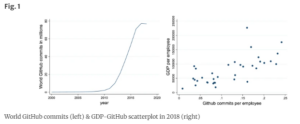With technology rapidly changing means that people need to adapt and integrate new software within their life in order to stay up-to-date. AI opens new opportunities for the education sector, but there are concerns around its proper use. AI has been used within education for a few years now with universities using it to detect plagiarism as well as it being used for analysing student data, but as there has been further development within the technology with the introduction of new software like ChatGPT being created, has caused an uproar into how the software should be used within education or even used at all.
Recently, all 24 Russel group UK universities have begun drawing up principles to ensure that students and staff are AI literate. At one stage, there were talks of banning software like ChatGPT in order to prevent cheating however, the guidance is now saying that students should be taught how to use the software appropriately within their studies which will help to make them aware of the risks of plagiarism, bias and inaccuracy in generative AI. The universities have reviewed their academic conduct policies and guidance to reflect the emergence of generative AI. The guidance states “These policies make it clear to students and staff where the use of generative AI is inappropriate and are intended to support them in making informed decisions and empower them to use these tools appropriately and acknowledge their use where necessary.”

The Benefits
AI has been found to be beneficial for the education sector with it being used by both students and teachers. One of the benefits of AI being used is that it allows for the students’ education to become more personalised. AI systems can analyse vast amounts of data which focuses on things like students’ performance, learning styles and preferences which in course of time will allow students to be taught more specifically to their needs and not in one generalised way of teaching. As well as it being beneficial for students, teachers have begun using AI systems for administrative tasks. A recent government survey found that one in five teachers work at least 60 hours a week but on average only spend about half of this time teaching. AI tools can help to streamline the process of these tasks and the teachers are able to spend more time focusing on teaching and supporting students.
The Limitations
Although AI could be beneficial to some extent for the education sector, it does have its limitations. One of the challenges of using AI would be the need for training, teachers would need to be shown how to properly use the technology in order to be able to use the software correctly. As well as teachers being taught how to properly use the software it is important that this is passed on to the students who are interested in using the software themselves. Another significant issue with the software is its lack of accuracy, the information which is provided is not always accurate. There have also been issues brought up around the ethical use of software like ChatGPT. Within a recent survey it was found that more than half of students consider using AI tools within their schoolwork to be a form of cheating with others saying that it is not a form cheating as they already currently use online resources to support their work.

In a recent article done by The Guardian earlier this year, they discuss how AI tools “raise a number of challenges and concerns, particularly in relation to academic honesty and plagiarism”. Software like ChatGPT is at a very high writing level making it harder for lecturers to differentiate between what is written by a human and chatbot. Universities are trying to discourage the use of the software by detecting its use within students work, if found using the software the students will be trained on the appropriate use of AI, any further use the students could then be expelled. Irene Glendinning, head of integrity at Coventry University said, “They’re wasting their money and their time if they aren’t using university to learn.” If the students are choosing to use the software to replace doing work instead of using it as an aid, punishments like these would ensure that the students are deterred from using it incorrectly which would be more beneficial for students to be independent within their work.
To Conclude
With some universities and schools beginning to embrace AI software within their learning system this will allow for a more versatile educational environment for students. Stating how AI software should and should not be used within education lets students and teachers understand to treat it as more of an aid instead of a replacement for doing work. There are clear positives to using the software but challenges which come along with it, it will continuously need to be reviewed and re-evaluated in order to meet the needs of the users but overall could enhance student learning globally. AI gives the opportunity for all students to receive a higher quality education in order to reach their highest potential if it is used to correctly.
In March 2023 we were eagerly awaiting the UK government’s white paper on AI, when it finally arrived, I went through and read it in its entirety. The key points in the white paper are:
When reading this whitepaper, I felt at the time it lacked data backing and clear structure in legislative reform, and that the strategy might halt innovation along the way. However, in the following months, GitHub, a leading open-source platform in software development tools, developed a technology that allows viewers to monitor innovation development within software development. This platform will be transformational for monitoring in all areas of data analysis, supporting innovation and contributing to global economic growth.

The platform allows users to measure and understand the global impact of developers, to address: previously, in a study commissioned by GitHub, it was found that a global issue was developing due to the lack of reliable and comprehensive data on trends in software and development. GitHub decided to build a platform with a dedicated webpage and raspatory, with data available to download dating back to 2020. The platform is updated quarterly renewing git pushes, developer stats, organisation insights, repository details, language preferences, licencing data, trending topics, and global and global collaborations within the global economy.
This platform will host a diverse audience of researchers, public policymakers, and developers. The platform is aimed at personnel involved in international development, public policy, and economic fields. The platform aims to remove barriers and democratise access to data, benefiting researchers without the need for third-party intervention. This will transform the knowledge of those within the sector to allow them to position themselves tactically to promote growth and development, whilst also helping give financial backers more of an insight into the pros and cons of businesses they invest in. In turn, this will boost productivity, financial backing, and the global economy, supporting the development of second and third-world countries and their income stream.

It has been found that a country’s open-source contributions correlate to international innovation and substantial economic growth. Access to online code and datasets allows advancing communities to establish a ground for learning through free learning tools and accessing more advanced systems has shown that if no country contributed to open-source development, the average GDP of a country would be 2.2% lower overall.

Source: Estimating the GDP effect of Open Source Software and its complementarities with R&D and patents: evidence and policy implications
These graphs demonstrate the correlation between increased open-source materials and the GDP per employee. The correlation trends towards GDP align with an active increase in open-source material. The new access to data that GitHub’s open-source platform brings will allow further development and understanding in the software space, producing more in-depth and compelling studies than before. These studies can help to develop policy which will help to foster and develop opportunities that can contribute to global economic growth.

At Polestar we are committed to utilising new software and technology to enhance our efficiency and knowledge. New tools such as the Innovation Graph will drive growth within all sectors and encourage innovation and advancement, with this growth new opportunities will arise for business owners that will lead to the need for financial advice. The swift development of platforms brings with it both new opportunities and new challenges. We will be interested to see how policy develops around the space and how tools such as Innovation Graph will supplement our work, I know in March of this year a tool analysing global tech development seemed almost out of sight.
Deloitte recently released its annual Gen Z and Millennial survey that gives insight on the next generation of workers. The start and end dates for their associated cohorts varies slightly, but it is generally agreed upon that Millennials comprise those born between 1981-1996, and Gen Z those born 1997-2012. The survey connected with 14,483 Gen Z and 8,373 millennials across 44 countries.
There are 3 key issues and trends for Gen Z and Millennials:
Key Issues
According to the survey, nearly half of Gen Z (46%) and four in 10 millennials (39%) say they feel stressed or anxious at work all or most of the time. Key factors driving stress levels are longer-term financial futures, day-to-day finances, and the health/welfare of their families. Mental health concerns, heavy workloads, poor work/life balance and unhealthy team cultures were also a consideration.
Whilst both groups agree that employers are starting to take mental health more seriously, support and resources are still under-utilised.
In terms of societal concerns, the high cost of living sits at the top, followed by unemployment and climate change. Half of Gen Z and millennials say they live paycheque to paycheque, and they worry that a potential economic recession has led employers to backtrack on climate action. They also worry that it will hamper their ability to ask for much needed pay increases, continue pushing for flexibility, or find new jobs.
To face financial pressures, Gen Z and Millennials are taking on side jobs, delaying key financial milestones such as buying a house or starting a family, and adopting money-saving behaviours such as buying second-hand clothes or not driving a car.
Whilst financial concerns loom, Gen Z and Millennials have differing outlooks. Gen Z are more likely to expect their personal financial situation to improve in the next year (44% of Gen Zs versus 35% of millennials).
More than six in 10 Gen Z (61%) and around half of millennials (49%) have experienced harassment or microaggressions at work in the past 12 months. These could be in the form of inappropriate emails, physical advances, and physical contact. Microaggressions include exclusion, gender-based undermining and unwanted jokes.
Of those who experienced harassment, around eight in 10 reported it to their employer, however, a third of Gen Zs and a quarter of millennials don’t think the issues were handled effectively. Women, non-binary people, and LGBTQ+ respondents are less likely to report harassment to their employer and less likely to feel their organisation responded well.

Key Trends
There are a few key items that are vital for Gen Z and Millennials: work/life balance, DEI, societal impact and environmental sustainability. Whilst companies are now pushing for these initiatives, the two groups have definitely seen an improvement in these aspects. However, whilst respondents acknowledge that their employers have made some progress, the majority remain unimpressed with businesses’ societal impact overall; less than half believe business is having a positive impact on society. Gen Z are slightly more likely to believe business is having a positive impact (48% versus 44% of millennials).
Gen Z and Millennials have high expectations from their employers and feel they have a key role to addressing social and environmental issues.
There are a few key trends when it comes to the role of work in Gen Z’s and Millennials’ lives. They think work is central to their identity, however a good work/life balance is the top consideration when choosing an employer.
Gen Z and Millennials value remote work and hybrid options. Three-quarters of respondents who are currently working in remote or hybrid roles would consider looking for a new job if their employer asked them to go on-site full-time. Condensed four-day work weeks—giving people more consolidated personal time, while avoiding some of the concerns that respondents have about part-time work, are also in high demand amongst the two groups.
There is also a rise in part-time jobs. Improving career advancement opportunities for part-timers is the highest-ranked solution among respondents for achieving better work/life balance. However, most don’t feel that reducing their hours would be a realistic option as they can’t afford the pay cut it would require. They also worry that their workload wouldn’t be reduced accordingly, and that they’d be passed over for promotion opportunities, or given less interesting work.
Climate change is a concern that colours many decisions that Gen Z and Millennials make, such as family planning, home improvements, what they eat, wear and workplace choices. With seven in 10 respondents saying they actively try to minimise their impact on the environment. Financial concerns may put a damper on these efforts; more than half of respondents think it will become harder or impossible to pay more for sustainable products and services if the economic situation stays the same or worsens.
They also see their employers taking a role to provide the necessary skills and training to prepare the workface for the transition to a low-carbon economy.

Key Takeaways for Business Leaders
Now that Gen Z and Millennials have highlighted the key issues and trends that affect them, it’s the job of business leaders to adapt their way to attract and retain the best talent. At Polestar, 75% of the staff belong to the Millennial and Gen Z category, with almost 63% being just Gen Z. Chances are your staff may also have a large contingent of the same age groups.
To remain competitive in the workforce and retain top talent, business leaders will need to accelerate progress towards aspects like work/life balance, DEI, and environmental issues. They will need to confront the financial concerns that their younger workforce will have, and ensure that organisations have the ability and responsibility to help ensure the financial wellbeing of their employees. An example can be offering market-competitive salaries and benefits. Employers will have to learn to be flexible in where and when people work, and learn to adapt for a hybrid model if possible.
Whilst change may be hard, it will become necessary as more and more of the workforce includes the younger generations.

A glimpse at our plastic-wrapped future, perhaps?
This weekend’s Lex column was gloriously titled “Recycling: plastics are a bottle neck in the war on waste” – we all love a good pun and at Polestar we are no different. Over recent years we have worked with a number of businesses that use recycled plastics in their products as they have sought to become more sustainable and meet growing consumer demand.
The bottom line is that recycled plastic is currently more expensive that new plastic and also has higher CO2 usage than virgin plastic. Why? Because recycling technology is still a work in progress. That is why Lego is moving away from using recycled plastic in its bricks.
So, to quote Lex: has the world bottled out of the war on plastic? This war really gained momentum following David Attenborough’s Blue Planet II. There was public uproar, causing firms to promise to reduce plastics and encourage reuse, with the public, for its part, promising not to buy anything with plastic packaging. Well, as often happens, and to quote from Lex:
“We have not stopped using plastic. Quite the opposite. Consumption has quadrupled over the past 30 years, says the OECD, driven by packaging, consumer products and textiles. And we have not made much progress on recycling and reuse. More than 80 per cent of waste still escapes such efforts.
“The scarcity of recycled plastic is a problem for consumer goods companies, particularly those in highly exposed sectors such as beverages. Targets will be hard to reach. And limited capacity means recycled plastic trades at a 20-30 per cent premium to the virgin kind according to Barclays’ Sustainable & Thematic Research team.”

Lex goes on to say:
“There is a market opportunity. Recycling plastic is an environmental imperative. Reaching company targets will require an annual supply of 40mn tonnes of recycled resins, says McKinsey, for $100bn in investment. Better still, a scaled up recycling system could deliver plastic that is cheaper than new.
“The technology is improving. Mechanical recycling — which basically entails washing and then melting bottles — is cheap, producing plastics at half the cost of new. But it only works for a small number of polymers and requires high-quality feedstock. It will probably be surpassed by advanced recycling — breaking down plastics at the molecular level using chemicals, which also reduces the need for careful upstream sorting.
“That puts the spotlight on companies that are adding capacity. Norway’s Tomra, active in sourcing, and Agilyx, which develops recycling technologies, are cases in point. Chemicals groups such as Eastman are planning facilities, while engineering and construction companies such as Maire Tecnimont run their own.”
The sector is still in its infancy, but de-bottlenecking the plastic supply chain will uncork its own rewards.

The pharma-race is on, with new start-up, Inceptive, raising $100m in a new funding round following seed funding of $20m last year, led by NVIDIAs NVentures and Andreessen Horowitz. Founded by former Google AI researcher Jakob Uszkoreit, Inceptive uses AI to design biological molecules for vaccines, therapeutics and other treatments. The software designs and tests new molecular structures in the lab to then be developed into new medicines. This exciting progress in the Healthtech space demonstrates the power AI has on global expansion and human health advancement.
Drug development usually costs – on average – somewhere in the region of $3bn, and takes over a decade to discover, develop and pass approval, with 90% of experimental drugs failing. AI promises to speed up this process for both drug development and molecular advancement. Morgan Stanley estimates that over the next decade, AI will enhance early-stage drug development and translate into 50 novel therapies worth more than $50bn in sales.
Start-ups like Inceptive have encouraged investors to bet on Healthtech start-ups that merge biotech and AI, demonstrating the confidence investors have in the AI drug discovery service. Funding from industry giants such as NVIDIA gives Inceptive access to world-beating platforms and access to its latest chips, allowing for far higher levels of computational power than would otherwise be available. AI startups have been facing a chip shortage resulting in a lack of development in sophisticated AI algorithms.

Ibex Medical Analytics is another AI specialist which has raised $55m in a series C round of funding led by 83North, this will be used to drive take-up on its Galen cancer diagnostic technology. According to the company, Galen can detect over 100 types of cancer and non-cancer samples from medical images. Thyme Care is another cancer specialist which has brought in $60 million in second-round funding, its platform allows members to find the right support and resources through its app, offering “round-the-clock guidance”. Polestar expects bespoke platforms such as Thyme Care will maintain funding momentum throughout the next few years.
In France, pathology system, Tribun Health, has completed series B funding worth €15 million, which the company says will be used to increase momentum in the development and commercialisation of its AI-powered platform and pharmaceutical laboratories. The round is also expected to go towards its expansion in sales and marketing across Europe and North America, along with contributing to the funding for Tribun’s acquisition of Eyedo, another computational pathology company.

As we see continued investment and backing into the health tech space, Polestar predicts an increase in M&A activity over the coming year, with smaller technology-forward companies being acquired by larger, brand-focused counterparts. Polestar will continue work with all parties to secure funding and explore their M&A opportunities whilst also watching the space to see how new companies such as Inceptive navigate the climate and bring transformative technology to the sector.
The healthtech space remains a dynamic playing field, ready to develop the future of healthcare. If you have an interest in the healthcare space, read our September 2023 Health and Education Sector valuation to find out more in-depth information about the M&A activity within the sector. Otherwise reach out to us for bespoke information and advice in the space.
When doing research into due diligence the other day, I came across some interesting articles that explored the relationship between investors and sustainability credentials within their portfolio. At the crux is a correlation between ESG investing and higher returns, lower risk and long-term business sustainability. But when you begin to consider how the implementation of ESG within a company can be transformative for both investor and business owner alike, how can businesses ensure they align their goals and principles to ESG measures?
When looking into ESG DD, I came across a survey by KPMG which found over half of its respondents had cancelled deals due to findings during the ESD DD process, with over two thirds of investors agreeing they would pay a premium for companies that aligned with their ESG principles. I wanted to explore the paradigm shift in investments and the role ESG consulting have on your companies ESG credentials.
80% of asset owners now have an ESG component in their investment strategies, with 68% finding significant improved returns from their portfolio’s integration of an ESG strategy. A PWC report comments on the two key forces driving ESG investment, these include:
Regulation has been a driving force behind ESG investing thanks to The European Green Deal pushing for a climate-neutral continent by 2050. The European Grean Deal Investment Plan hopes to unlock €1 trillion of sustainable investments in 2030 as a support into to the climate neutrality transition.
Asset managers have been left with a choice of how to adopt new legislation and guidance into their portfolio, either by accepting the shift and adapting to the new legislation or viewing the shift as an opportunity to establish ESG as part of their DNA to align with ambitious long-term industry trends. Both of these options are feasible for asset managers and will be approached through strategy, client offering and risk management.
Whilst asset managers shift toward ESG investing, they are also looking for a breadth of ESG compliance throughout sectors, this leaves companies who are vulnerable to stagnation the opportunity to adapt and deliver ESG prospects for investors. Through consulting an ESG expert, companies will be able to develop their ESG strategy and align with the new international investment goals.
The ESG consultancy sector is growing rapidly, with a market trajectory of 17% CAGR from 2022-2027, the ESG consultancy global market is expected to reach $16 billion by 2027. This rapid growth is expected due to a consistent uptick in ESG decision making within organisations of all sizes and sectors. This uptick in ESG adoption is due to a proven track record of benefits to the bottoms lines, improved returns and financial performance, along with investor power and global regulation.
“As we continue the countdown in this ‘decade of action’ [..] the E&S consulting sector is ideally positioned to grow in scale, scope and stature” – Liz Trew, Environment Analyst
Data from the Environment Analyst has demonstrated a pack of industry leaders exerting their ESG-driven market dominance. Perfect conditions have increased M&A deal activity, whilst PE funds have increasingly established direct funds for the ESG space to encourage sustainable investment strategies.
Green-driven changes to the regulatory environment have encouraged companies to seek ESG consultancy advice to strategically advance ESG credentials and follow new implemented legislation. In February 2022, the European Commission adapted a proposal for the corporate sustainability due diligence directive (CSDD) to necessitate strategic and operational change within global business.
The EU’s Corporate Sustainability Reporting Directive (CSRD) is transforming the way companies must report their ESG credentials. Almost 50,000 companies are subject to mandatory sustainability reporting, starting in 2024. These companies include non-EU companies who have subsidiaries in the EU. This has put pressure on companies to enforce new ESG regulations.
ESG reporting is now going mainstream as companies reporting is coming under growing scrutiny, to ensure compliance is followed companies can do the following:
By incorporating even a few of these practices into your daily business operations, the company will seamlessly align with the new ESG reporting frameworks and demonstrate its credentials. Additionally, this will propel your company’s valuation forward and incentivise investors to dedicate time to scrutinising your business. When your company is nearing the point of M&A you can be assured that your ESG DD will be a smooth and positive process, boasting your ESG performance to the new shareholder.


Last Wednesday’s Financial Times had three articles highlighting the issues and cost around ESG and sustainability reporting for companies. For instance, it reported that Vanguard – the US investment titan with $7.7 trillion under management (more than twice UK national debt) – has backed just 2% of environmental and social shareholder proposals this year because of a rise in the number of resolutions it considered “overly prescriptive” and “overreaching.”
Vanguard said many of the shareholder proposals this year went too far, for example, by seeking “specific actions from companies including changes in company strategy or operations”. By way of reference, that 2% is down from 12% last year.
Across the pond, ESG investing is becoming increasingly politicised. Recently, Republicans rallied against investment managers such as Vanguard for “woke capitalism”, with Wall Street being attacked for pushing what the GOP calls “far-left” positions on environmental, social and corporate governance issues.
Here in the UK, it is reported that added transparency on issues such as climate are seen to take the focus off strategy – a view held by 80% of FTSE 350 boards. The Chartered Governance Institute has said that while company reporting is essential to transparency, the rapid emergence and proliferation of non-financial reporting requirements has, in effect, led to boards spending too much time looking backwards rather than forwards.
Here at Polestar, we have started the process of becoming a B Corp. What a summer project that has been! Thank you, Anusheh, for leading on this. Yes, there is plenty of looking backwards, ensuring we have the requisite policies in place, and so forth, but – and it is an important but – it has helped us focus on our future as we consider how to optimise ourselves as a sustainable business, through which we deliver on our mission: “to guide shareholders to achieve their business goals and give our people rewarding and purposeful work.”
Reporting pressures are expensive, time consuming and need to be appropriate, otherwise they get in the way of business. I imagine when accountancy was in its infancy it too was thought of as burdensome. Over time, however, I think we can all agree this has become a good thing.
We have all experienced how implementing new initiatives – such as meeting regulatory requirements – initially sucks excess senior brain power before the teams are in place to deliver the business’ needs smoothly and effectively. This brain power is well invested in 2023, as not only is a business at reputational risk but, if the proposed new “greenwashing” penalties are instigated, this will be a married to significant financial risk. In the meantime, would it not be great if, in looking at our businesses in a different way, we found better approaches to deliver our goods and services in a manner which is less impactful on our environment and better for our employees and stakeholders?

At the beginning of the summer holidays I asked if you might find time to complete a sustainability survey – thank you to those who have completed it. For those who have yet to give us the 5-10 minutes, it would be really helpful to hear your real views on this subject. Whether you are culturally conservative and/or sceptical of the climate change claims, think that the pace/direction of social change is damaging, or whether you are very alert to, and aware of, social justice and environment issues, we really want to know your views (happy for them to be anonymous). Please click the picture below or
on this link to complete the survey.
We will share the findings in October. Before then, enjoy the crisp sunny mornings and the long, warming shadows of late summer.
The World Economic Forum recently released its annual report highlighting the emerging technologies shaping the current world. The report looks at technology that is impacting 5 different areas: people, the planet, prosperity, industry and equity.
I occasionally read reports from the WEF, and this was a particularly interesting one to read because a lot of the technologies mentioned in the report are ones that Polestar has touched on with previous clients, either within healthcare or ESG. Whilst the report goes through technology in quite some detail, one sector caught my eye that Polestar has just recently engaged with: mental health.
The mental health market has been getting quite some traction after the pandemic, so it is no surprise an emerging technology covers this space. In fact, according to Global Newswire, the digital mental health market size will be worth USD 69.44 Billion by 2030, growing at a 20% CAGR.
This growth, according to the report, was driven by “the mental health crisis that existed prior to the COVID-19 pandemic and has since increased to unprecedented levels, making conditions ripe for metaverse-enabled mental health treatment. The number of mental health providers is insufficient to meet the escalating crisis.”
One solution presented for this is the metaverse. The report defines the “metaverse for mental health” as “shared virtual spaces to improve mental health” and says the future of virtual shared spaces enhanced include augmented or virtual reality.
Gaming platforms already exist for this. These platforms increase patient engagement and destigmatise mental health issues, and are sure to be popular with the younger crowd. The report cited a few examples, which are:
Polestar has recent experience in the mental health and wellbeing space, completing a transaction this year. We advised on the sale of the business and assets of Companion Apps Ltd through an asset purchase agreement to Terryberry Company, LLC, a US-headquartered employee engagement business. Read our press release here.
The Companion product provides mental wellbeing support to enterprises and their employees. The offering includes expert-led online workshops and training programmes that tailor app content for each user to help improve and sustain the mental wellbeing of employees. This transaction allowed Companion to scale as a business and allowed Terryberry to expand its tech stack.
Polestar’s experience across the ESG space and – more specifically – within employee reward and recognition, meant it was aware of international buyers looking for a mental wellbeing solution to complement their existing tech stacks, which helped accelerate the sale. Polestar previously advised on the sale of People Value, the employee recognition and reward business, to its management team in a transaction backed by Ethos Partners. Read our press release here.
The reward and recognition market helps enterprises provide health & wellbeing for their employees, in the form of shopping benefits, salary sacrifice, gym offering, mindfulness online courses, etc. As the mental health crises grows globally, we can expect that a lot of employees will be expecting their employers to implement solutions that help them manage their stress and anxiety. This is the opportunity for apps (like Companion), employee engagement providers (like PeopleValue), and the metaverse to provide solutions to a growing problem.
The mental health and reward and recognition space is an area that Polestar knows very well. ESG is now a key focus of ours because we see this as the way of the future; the rise in the ESG market shows us that the private sector is heading in the right direction.
With the rapid rise in demand for this space, this could be a good time to explore your options for raising funding or securing a valuable exit. If you want to get in touch about anything ESG/mental health/wellbeing related, don’t hesitate to do so. Like always, if you have any interest, do reach out.


A survey published last month concluded that only half of employees (52%) would describe their mental health as good, this compared to 66% in early 2020 clearly highlights what is becoming a rapid deterioration. As a result, businesses have begun to embrace a wide range of employee wellness services, and top employers are being forced to introduce increasingly attractive benefits both to attract and retain top talent.
As we all know, health and wellness does not have a one size fits all solution. The wide range of solutions such as therapy, counselling, life coaching and mindfulness to name just a few can create and foster an environment of inclusivity. This minimises the risks of employees being left out in the cold through a lack of appropriate solutions and as a result become less productive.
Recent research from Deloitte has indicated that for every £1 spent on enacting some kind of mental health support gains an additional £5.30 in billings and productivity when solutions operate on a billable hour model’s rather than a fixed-fee basis. This return will no doubt foster a culture of openness and innovation as service providers and platforms seek to build their services and technologies into the new era of human resource management.
Have a read for yourself – all opinions welcome!
It would be difficult to miss the 75th birthday of the NHS this week.
The milestone birthday has provoked plenty of commentary and adhoc examples, largely positive, but also negative on the support it provides, alongside recognition of the issues it faces day to day and long term.
A recent BBC article gives an interesting summary of some of the fundamental issues facing the NHS and approaches that might be possible. To summarise a few key points:
Fundamentally, the baby boomer generation is reaching old age, and whilst lifespans have extended, only party of this is due to better health and diet:
“Life expectancy gains since the NHS’ creation have not been matched by increases in healthy life expectancy – on average, people are now expected to spend more than 20 years living in ill-health, according to the Office for National Statistics.”
“The ageing population means huge numbers of people are living with chronic health problems, such as heart disease, dementia and diabetes that require long-term care and for which there is no cure.
It is already estimated about £7 out of every £10 spent in the NHS goes on people with these conditions. On average, those over 65 have at least two.”
With an accumulated health deficit from lifestyles led much of the future demand on the NHS is already visible.
Reading a few articles and listening to radio dial in shows with a mixture of knowledgeable experts and armchair pundits with a range of views, experiences and political standings, it is clear that some fundamental change is needed to make it fit for the future. What is less clear is the plan to do it.
If some of the comments heard on the radio in recent days are anything to judge by (even accepting those dialling in may have stronger views than the general populus), we have too much blaming and politicisation of the issues, issues which are fundamentally consistent, whoever is in power. And of course the NHS is a political football, despite the laudable cross party committees that operate more quietly in the background of the headline grabbing party campaigning.
Humans as a rule prefer the status quo and people can get riled up quickly by one side or another. The reality is we have to improve efficiency [ https://polestarcf.com/asking-the-right-questions-uk-healthcare-and-the-nhs/ ] across the NHS.
Clean thinking is needed, with a removal of people’s “sacred cows”. The following isn’t an exhaustive list, but:

Expertise
In most businesses, directors intending to sign a legal document would refer to their lawyer, bringing in skills and a perspective that are not available in-house. Outsourcing works in similar ways for other services and sectors, bringing in skills and different approaches that can result in higher quality in particular areas.
Investment
The private sector (as a whole and not just the successful ones that actually end up making profits) is taking a long term investment decision, whilst the NHS is trying to plug the gaps to a degree and cannot be so entrepreneurial. Yes this is ultimately largely driven by expectations of financial reward, but at the same time it is taking on risk which the NHS doesn’t have to cover.
This investment is more effective within the successful healthcare businesses, to a degree because they start with a clean sheet, which brings huge benefits relative to the NHS, where modes of working have been engrained over time. If private businesses think there is a more profitable way to provide the same, or arguably better care, they will actively develop a plan to invest and implement.
Finally, this profit is generally not the expense to the NHS but rather a saving. The budget impact is not the profit “passed” to the private sector, but the relative price paid out of the NHS budget for doing something using NHS resources v non-NHS resources. Unsurprisingly the private sector can do certain things more efficiently than the huge behemoth that is the NHS.
Happy Birthday NHS…and as Spock would say “Live long and prosper!”
As we focus increasingly on sustainability and diversity, we often come across issues that have very different outcomes to those expected. Outlined in this blog is an example of what Management Today has headlined “benevolent sexism”, and how it can hinder women’s career development and increase the possibility of a backlash against female leaders.
It is only “natural” to communicate differently with men and women. After all, traditionally men are famously from Mars whilst women are from Venus. Although we are more similar than we are different, it seems humans instinctively trend towards seeing women as more altruistic than men, who are typically seen as more selfish.
An article by the University of East Anglia states the following:
“In both the public and private sectors, leaders often make decisions that affect the wellbeing of others. For example, political leaders make policy choices that affect the welfare of their constituents. In many situations, they face a choice between maximising their own payoffs and maximising the payoffs of others. In these types of environments, the traditional view on gender roles posits that women are more likely than men to act in an altruistic way.”
This is now backed up by research from the University of East Anglia and the Universities of Melbourne and Monash in Australia. This research found that the observed gender biases in such assessments are exhibited by men, and to some extent, evaluators who act in a more prosocial manner, that is, in a way that benefits others. The researchers asked how leaders’ decisions are evaluated and whether evaluators are biased in their attribution of outcomes between female and male leaders in such environments.
“Due to society’s growing demand for social responsibility, those in leadership roles are under more scrutiny than ever before,” said Dr Boon Han Koh, of UEA’s School of Economics and Centre for Behavioural and Experimental Social Science. “As a result, leaders across the board are expected to be aware of their impact on social welfare and engage in more prosocial activities.
“The actions of leaders are motivated by prosociality (taking responsivity for others), which in turn have consequences on the welfare of group that they are leading. It is therefore important to understand whether male and female leaders are assessed differently, since the evaluations are likely to affect individuals’ decision-making processes.
“We find that positive outcomes of male and female leaders are not treated differently, suggesting that men and women are deemed to be equally altruistic after being seen to achieve positive results.
“However, while the low outcomes of male leaders are blamed more on their selfish decisions, those of female leaders are attributed more to bad luck. Hence, in the case of failure, men are assigned more blame than women and perceived as being selfish.”
“The actions taken by the leaders could not be observed by the other group members, the evaluators, meaning they were judged solely on the outcomes they delivered. However, their gender was revealed to the rest of their group. The team found biases in the attribution of outcomes that seemed to favour women, but warn this might not be a good thing. “
“One interpretation of our results is that male evaluators may see the need to treat female leaders more favourably, therefore giving them a greater benefit of the doubt in the face of failure,” said Dr Nisvan Erkal from the University of Melbourne.
“A possible explanation for this is benevolent sexism, which tends to lead to behaviours toward women that are often characterised as prosocial. It is driven by the stereotype that women need to be protected.”
So, it seems men act differently to women when they fail. This could be because they are acting protectively, do not wish to be accused of sexism or feel repressed in their approach to dealing with women and fear a non-male reaction. What is clear is that women do not give other women the same benefit of the doubt, which explains why a number of women I know do not understand why some of their female colleagues ‘get away’ with poor performance.
This is a double whammy for the protected females. This ‘benevolent sexism’ may appear less damaging than ‘hostile sexism’, but, warn the study’s authors, it can still lead to adverse outcomes for women.
“For example, gender biases in evaluations that favour women may hinder the development of their careers and increase the possibility of backlash against female leaders in the long run”
The protected females are not getting accurate feedback on performance, which does not inform them on the improvements they can make; which, in the long term, will hinder their careers and reduce their (and the organisation’s) effectiveness.
Professor Lata Gangadharan, from the department of economics at Monash, warns that such gender biases “may also lead to distortions in the incentives offered to all decision-makers in positions of power, male and female, and harm the future actions taken by them”.

London 12th June 2023 – Polestar has advised the shareholders of Africa Matters Limited on its sale to New York-based J.S. Held.
Global consulting firm J.S. Held announced on 1st of June that it has acquired Africa Matters Limited, an Africa-focused strategic advisory firm providing business intelligence, stakeholder engagement, and sustainability & ESG consulting services. Africa Matters Limited advises investors as they grow and expand across the African continent, as well as working with clients and host governments to find common ground and points of alignment on investment and trade issues.
Headquartered in London, with an office in Kampala, Uganda, the acquisition allows J.S. Held to expand its investigations practice into Africa, while also providing clients of Africa Matters Limited access to new resources and experts within J.S Held’s team of more than 1,500 professionals.
Ross Alexander, Executive Chairman of African Matters Limited, shares:
“I never thought selling the company (that I was a major shareholder in) would be such a complex and long process. Selling to an American buyer also presented its own unique challenges. On both fronts; 1. The complexity and length of the process and 2. The nature of the buyer; Polestar’s team, led by Charlie Whelan, was critical to the successful outcome we reached. Charlie was relentless in his laser like approach to ‘mission critical’ issues that frequently arose and he acted with speed and commercial savvy at all times. Conor Barrett was particularly helpful as the deal moved towards completion and was efficient and accurate when compiling daily reports on key deal related numbers.”
Charles Whelan of Polestar added:
“We are delighted to have helped this impressive team, one of the leading advisory firms across the African continent, to join J.S. Held – a global, multi-disciplinary consulting practice. This acquisition immediately opens up Africa, which is growing rapidly in significance, to J.S. Held’s expanding New York and London teams.”
Philip Worman, Senior Managing Director in the London office of J.S. Held commented:
“The acquisition of Africa Matters Limited expands J.S. Held’s Global Investigations Practice and our wider business, further strengthening our expertise in risk consulting. Africa Matters Limited has deep expertise and experience in Africa, strengthening our ability to help clients enter these fast-growing and complex markets.”
Africa Matters Limited was advised by Polestar and Stevens & Bolton. J.S. Held was advised by Colm Advisory and Goodwin.
